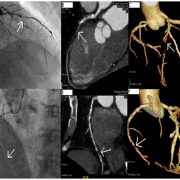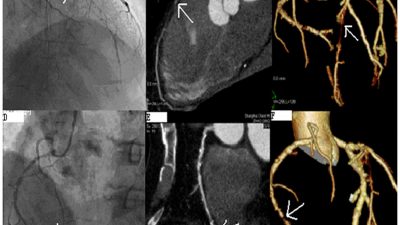New insight into depression and anxiety in cardiac rehab patients suggests a negative impact on outcomes, inspiring us to take a deeper look at the state of patient-reported outcomes in cardiology (PROs). This Quality Matters news-brief rounds up the latest studies, commentary and news stories on patient-reported and quality of life outcomes in cardiology. And new research suggests TAVR outperforms surgery on patient-reported endpoints in low-risk patients at one-year.
Anxiety, Depression May Reduce Adherence to Cardiac Rehabilitation – Healio CardiologyToday
A study published on October 10, World Mental Health Day, in the European Journal of Preventive Cardiology reminded cardiologists to take the mental health of their cardiac rehabilitation patients into account. One in five cardiac rehab patients experience depression and anxiety and are more likely to drop out of rehab.
Our previous edition of Quality Matters summarized an article that discussed the somewhat untapped potential impact of innovations and optimizations in cardiac rehab to improve cardiovascular outcomes across the board. Understanding the impact of patient-reported outcomes and quality of life metrics like depression and anxiety could also play a major role in improving quality of a holistic cardiovascular service line.
“Comprehensive, proactive screening, referral and treatment of moderate depression and anxiety symptoms within cardiac rehabilitation programs is required to decrease the severity and impact of depression and anxiety symptoms and to improve adherence to recommendations for heart disease risk factor management, thereby reducing future cardiovascular risk,” write the study’s authors. Read more »
Are Patient Reported Outcomes the New “Gold Standard” in Performance Measures? – DocWire News
Thinking about patient-reported outcomes (PROs) inspires us to jump back to this commentary from John Spertus, MD, MPH of the University of Missouri-Kansas City who discussed PROs at the American College of Cardiology Annual Scientific Session in March. “There is a call growing for the integration of PROs as quality metrics in assessing the quality of care,” said Dr. Spertus. “Focusing on PROs can motivate us to start to improve the way we treat our patients. We all should be advocating for this as a performance measure.”
Dr. Spertus developed the Kansas City Cardiomyopathy Questionnaire to assess patient health status and quality of life. Read more »
Jason H. Wasfy, MD: Optimal Inpatient, Outpatient Heart Care – MD Mag
Also coming out of the ACC’s 2019 Scientific Sessions in March, MD Mag interviewed Jason H. Wasfy, MD, directory of Quality & Analytics at Massachusetts General Hospital, who touched on the value of patient-reported outcomes versus administrative data. “There’s limitations to the use of [administrative] data—it’s just a billing code that doesn’t really encapsulate what’s happening with a patient,” said Dr. Wasfy. “Patient-reported outcomes are a much more promising way to do it, but those aren’t routinely collected in everyday practice. So we’re far from an ideal learning healthcare system.” Read more »
How Hospitals Are Using Patient-Reported Outcomes to Improve Care – Harvard Business Review
This 2017 article in the Harvard Business Review did an excellent job of summarizing several initiatives in the use of patient-reported outcomes and the potential for PROs to directly impact quality of care and quality improvement at provider organizations.
Notably, Dr. Shehzad Niazi of Mayo Clinic designed a patient-reporting system to improve the quality and speed of clinical care conversations and reduce time needed for documentation—critical endpoints for clinicians—in addition to utilizing PROs for quality assessment. “Patients give the program high ratings, and Mayo doctors are happy too; natural language processing and strategically-designed automated-report generators are saving them time — 15 minutes per initial evaluation per patient, on average,” reads the article.
The article summarizes the use of PROs at-large: “At present, programs such as the ones described here are concentrated within a small group of pioneers, but they have tremendous potential to be emulated and scaled. The task today is to ensure that governments and hospitals refocus the aims of their outcomes collection efforts to ensure that they prioritize its use to improve clinical care.” Read more »
Should we Prioritize Patient-Reported Outcomes in Cardiology? Accreditation for Cardiovascular Excellence Focuses on Outcomes to Improve Clinical Care
We at Accreditation for Cardiovascular Excellence understand that data shouldn’t be collected just for the sake of it—but rather, specifically to improve clinical care. Other accreditations do little to analyze what they collect or why, but ACE continues to invest in science to study our standards and our data’s impact on clinical outcomes at a procedural level. ACE also uses the data we collect intentionally to support our accredited organizations in enacting or improving meaningfully on their quality improvement programs. Accreditation through ACE is not just another time-consuming check on administrative data, but an outcomes-focused, qualitative review that makes a difference. Learn more here »
TAVR Improves Health Status Over Surgery in Low-Risk Patients at 1 Year: PARTNER 3 – TCT MD
New science is also taking a deeper look at patient-reported outcomes in cardiac care—a new study presented at TCT 2019 in September found small but sustained health status PRO benefits of TAVR versus surgical valve replacement through one year. The study used Spertus’s Kansas City Cardiomyopathy Questionnaire to show a substantially improved health status for patients who received TAVR vs. SAVR at 1 month, a benefit which persisted through 6 and 12 months.
“Even in a low-risk population, there is a huge value from a patient-reported outcomes standpoint with [TAVR],” said Suzanne J. Baron, MD, of Lahey Hospital and Medical Center in Burlington, MA to TCT MD. “A lot of these patients want to get back to what they’re doing—they want to be able to interact with their families—and in the low-risk populations it’s even more important.” Read more »














Medical experts should always consider the patient-reported outcomes in cardiology as reference for future cases and developing new technologies in treating heart ailments.